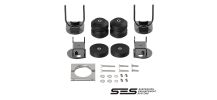Towing isn't just about attaching a trailer to your vehicle; it's about knowing the right techniques and safety precautions. This includes understanding the weight capacity of your vehicle, choosing the right trailer for your needs, and being aware of the legal requirements for towing in your area. Whether you're hauling a small cargo trailer or a large RV, the fundamentals of towing a trailer remain the same: proper equipment, regular maintenance, and cautious driving.
Rigid Hitch Inc. – Your Partner in Safe Towing
At Rigid Hitch Inc., we recognize the importance of safe and reliable towing. As a leading manufacturer and warehouse distributor of trailer hitches, towing accessories, and related products, we cater to individual and business needs. Our range of products is designed to meet diverse towing requirements, from light-duty garden trailers to heavy-duty commercial loads. With Rigid Hitch Inc., customers can access top-quality hitches, durable towing accessories, and expert guidance, ensuring a seamless and secure towing experience every time.
Understanding the Basics of Towing
Towing a trailer is a task that requires careful consideration and knowledge of the fundamentals to ensure safety on the road.
One of the first things to determine is your vehicle's towing capacity. This information can typically be found in the vehicle's owner's manual or by consulting the manufacturer. Towing capacity is the maximum weight your vehicle can safely pull, and exceeding this limit can lead to dangerous situations on the road.
Next, consider the type of trailer you plan to tow. Trailers come in various sizes and styles, from utility trailers for hauling equipment to travel trailers for camping adventures. Matching the trailer's weight and dimensions with your vehicle's towing capacity is essential. Choosing a too heavy trailer can strain your vehicle's engine and braking system, jeopardizing your safety.
Choosing the Right Trailer and Tow Vehicle
The trailer should complement your towing needs and be equipped with the necessary features for secure transport. For instance, a trailer with sturdy construction and reliable brakes is essential if you plan to haul heavy loads.
Your tow vehicle also plays a significant role in the towing process. Ensure that it is equipped with a suitable towing package and has the power to handle the trailer's weight. Many vehicles come with towing packages, including enhanced cooling systems, reinforced suspensions, and trailer hitch receivers. Utilizing these packages can make your towing experience smoother and safer.
Essential Towing Equipment: Hitches, Brakes, and Lights
A reliable trailer hitch is a critical equipment that connects your vehicle to the trailer. A qualified technician should adequately install it to ensure a secure attachment. The type of hitch you need depends on the trailer and towing requirements, so consult an expert for guidance.
Brakes are another vital aspect of safe towing. Trailers should have functional brakes that can synchronize with your tow vehicle's braking system. This helps in maintaining control and stopping safely when needed. Regular maintenance of these brakes is essential to avoid accidents on the road.
Additionally, ensure that all the lights on your trailer are in good working order. This includes turn signals, brake, tail, and marker lights. Proper lighting is crucial for communication with other drivers and ensuring your trailer is visible, especially in low-light conditions or bad weather.
Checking and Securing the Trailer Load
Before hitting the road with your trailer in tow, it's imperative to ensure your cargo is appropriately checked and secured. Neglecting this crucial step can lead to accidents, damage to your trailer, and even injury to you and other road users. Here's a comprehensive look at checking and securing the trailer load.
Begin by inspecting your cargo for any loose or protruding items. Even seemingly minor objects can become dangerous projectiles if not adequately secured during transit. Use quality tie-down straps, cargo nets, or ratchet straps to secure your load. Ensure these restraints are correctly tightened, and double-check them to remain secure throughout your journey.
Balancing and Distributing Weight Evenly
Balancing and distributing the weight of your trailer load evenly is essential for both safety and vehicle performance. Improper weight distribution can lead to trailer sway, reduced steering control, and increased braking distances. To avoid these issues, follow these guidelines:
- Place heavier items near the trailer's axles to distribute weight evenly.
- Avoid overloading the front or rear of the trailer, as this can lead to instability.
- Use a trailer tongue weight scale to determine if you have the right balance. The tongue weight should be about 10-15% of the trailer's total weight.
- Periodically check the load during your journey, especially after hitting bumps or rough patches of the road, to ensure it remains properly balanced.
Connecting and Testing Trailer Lights and Brakes
Before you start your journey, connecting and testing your trailer lights and brakes is a critical safety step. Properly functioning lights and brakes ensure you are visible to other drivers on the road and can safely stop your trailer when needed.
Begin by connecting the electrical plug from your trailer to your tow vehicle. Ensure that the plug securely fits into the socket and that all connections are clean and corrosion-free. Test your trailer lights, including turn signals, brake, tail, and hazard lights, to confirm they function correctly.
Test your trailer brakes to ensure they engage when you apply them in your tow vehicle. Electric trailer brakes should be adjusted to provide adequate stopping power without causing the trailer to skid. Regular maintenance and testing of lights and brakes are essential to safe towing practices.
Safe Driving Practices While Towing
Safe driving practices are paramount when towing a trailer, as your vehicle-trailer combination's added weight and altered dynamics require special attention and consideration. Whether you're a novice or an experienced tower, these safe driving practices are crucial for a smooth and secure journey.
First and foremost, maintain a safe following distance from the vehicle in front of you. Towing increases your vehicle's stopping distance, so giving yourself extra space ensures you have enough time to brake safely. Remember that the larger and heavier your trailer, the more room you'll need to stop effectively.
Anticipate stops and turns well in advance. Sudden braking or last-minute lane changes can lead to instability, sway, or even jackknifing of the trailer. Plan your maneuvers carefully and signal your intentions clearly to other drivers. Avoid abrupt actions that could catch other road users off guard.
Maintaining a consistent speed is key to safe towing. Avoid excessive speeding, as it can exacerbate trailer sway and make it difficult to control your rig. Drive within the posted speed limits and at a speed appropriate for your towing setup and the road conditions.
Get Started with Rigid Hitch Inc. Today!
Ready to get on your towing journey? Turn to Rigid Hitch Inc. for all your towing needs. Whether you're in the market for a sturdy trailer hitch, reliable towing accessories, or expert advice, we have you covered. Our extensive inventory caters to various towing applications, ensuring that you find exactly what you need for your specific task. Visit us today and experience the difference that quality products and knowledgeable service can make in your towing adventures. Let's tow safely and efficiently together!







